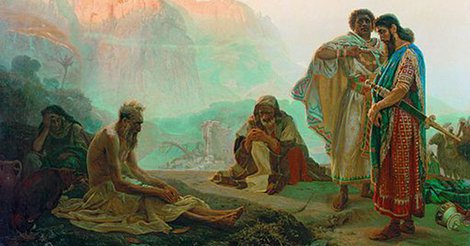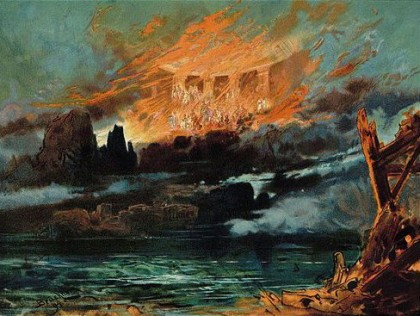
This is a spoiler-free reflection on Batman v Superman: Dawn of Justice.
The Bible is coming to the big screen. You’ve maybe heard about Risen, the latest dramatization of the life of Jesus. Or Miracles from Heaven, a modern day story of healing attributed to faith. This weekend we get God’s Not Dead 2, an adaptation of Christian apologetics. But the biggest Biblical blockbuster, the one that opened on Easter weekend, is Batman v Superman: Dawn of Justice. It desperately wants to be a passion play (among many other things) but it left me thinking about the book of Job.
Batman v Superman is not shy about its theological aspirations. The labels of ‘god’ and ‘devil’ are applied liberally. You are meant to be aware of the mythic qualities of superheroes at all times, and just in case you miss them, a literal Amazonion warrior joins the titular clash of titans. In a bit of mythological mashup, there’s a Wagnerian quality to the storytelling; the film moves freely in and out of what would be dream (or nightmare) sequences in other films but here are stylistically and logically indistinguishable from the rest of the narrative. To this mélange is added a generous dash of Christian imagery. I can only assume this is meant to suggest that ancient mythology, Christianity, and superheroes are all just manifestations of our subconscious, but it all felt a bit muddled.
While the storytelling failed to explore its themes coherently, the dialogue did make a few explicit declarations that were hard to ignore. During a pivotal scene, Lex Luthor (the obligatory villain) shares what he feels is a profound revelation: If God is all powerful, he cannot be all good, and if God is all good, he cannot be all powerful. Since Lex is a (young) man of science, he naturally decides to put God to the test. In this way, he is playing the role of the accuser in Job. Lacking access to the Almighty, Luthor opts for what he thinks is the nearest available analogue: Superman. Superman has more power than any human, so he must be at least a god. So Luther creates what he believes is a dilemma that will either force Superman to do something evil, or to reveal the limits of his power.
I won’t spoil the details of the dilemma or how Superman deals with it, because they are largely immaterial. This movie and the preceding Man of Steel have already demonstrated that Superman is not omnipotent, so it’s not clear how this test speaks to the theological themes it is meant to address. At the same time, the movie has also shown Superman does have sufficient power of the right sort to sidestep the whole puzzle, but it wants us to feel the weight of what you might recognize as the logical problem of evil and so it doesn’t let Superman off that easy.
(Aside to aspiring scientists: Testing hypotheses in model systems is a powerful tool in science. Sometimes you can’t directly observe the thing you’re really interested in—it might be too big or too small or too precious or too complicated. You just need to make sure that the answers you get from your model apply to the questions you have about your real subject. Don’t make Lex Luthor’s mistake.)

How does a Christian respond to this problem of evil? Books upon books have been written on that topic; I recently reviewed one that offers a unique and scientifically-engaged answer, and that’s just one alternative among many. Since Lex Luthor reminded me of Job, let’s look at the answer it offers. That brings us back to the question of whether Christianity is just a gloss on Bronze Age mythology.
If the Greek or Norse pantheons are the product of human imagination, then there’s a fairly straightforward explanation for them. In trying to understand why the world behaves the way it does, it is natural for humans to think in terms of power and agency. Humans can use their power to affect the natural world according to their will—move a rock, kill an animal, plant a seed. Surely bigger effects just need more power, hence gods. Why plural? The world is complex; whenever a new phenomenon comes along that doesn’t fit the existing narrative, you can always add a new character to the pantheon. You have unlimited explanatory power this way; any question about why something did or didn’t happen can be answered “because such-and-such god wanted it.”
Unfortunately, that explanatory power only applies to the past, not the future. By bending and contorting the whims of the gods to match every historical detail, they become capricious and inscrutable; who knows what they’ll do next? This same problem arises in science. It is always possible to create a theory that fits existing data perfectly, but such theories rarely predict future data very well; this is called overfitting. The solution to overfitting is to relax the fit on past data to get better predictions.
This tradeoff is exactly what Job offers in contrast to the Bronze Age approach. Proposing only one God actually makes the counterintuitive move of giving up some of that ability to explain the past. We are so wired to find explanations that I’m guessing some will find this assertion troublesome. But it’s really the only option. Clearly a mercurial, polytheistic pantheon can fit all the data because it has unlimited degrees of freedom. So the best monotheism can do is match that explanatory range. And if even one event remains mysterious in favor of consistency of God’s character, then monotheism explains less (at least in terms of God’s actions). This is precisely the central tension in Job, between Job’s friends who want to explain all of Job’s misfortunes and God who offers his eternal steadfastness as an alternative to that explanatory power.
Fortunately, a God who is the same yesterday, today, and tomorrow can be relied on. If he has demonstrated goodness in the past, he will demonstrate it again in the future. That’s not to say we should never seek to explain the evils of the past (possibly by accepting responsibility), nor that an appeal to mystery will be satisfying. But consider the story of Easter. The death of Jesus was devastating, defying all expectations and explanations for the disciples. Many of us will be in a similar situation at some point in our lives, contemplating a tragedy that shakes our understanding of how the world works just as the earth shook on Good Friday. On those long, dark Saturdays of the soul, we’ll have a choice. We can adjust our idea of God for a complete explanation now—that God either acted evilly or God was unable to act—or we can believe God is consistent and gain the hope of Resurrection Sunday. If God was alive in the past, he will live again in the future. This is the choice of faith, and despite what Lex Luthor might think, it is the scientific choice as well.
Andy has worn many hats in his life. He knows this is a dreadfully clichéd notion, but since it is also literally true he uses it anyway. Among his current metaphorical hats: husband of one wife, father of two teenagers, reader of science fiction and science fact, enthusiast of contemporary symphonic music, and chief science officer. Previous metaphorical hats include: comp bio postdoc, molecular biology grad student, InterVarsity chapter president (that one came with a literal hat), music store clerk, house painter, and mosquito trapper. Among his more unique literal hats: British bobby, captain’s hats (of varying levels of authenticity) of several specific vessels, a deerstalker from 221B Baker St, and a railroad engineer’s cap. His monthly Science in Review is drawn from his weekly Science Corner posts — Wednesdays, 8am (Eastern) on the Emerging Scholars Network Blog. His book Faith across the Multiverse is available from Hendrickson.

Leave a Reply